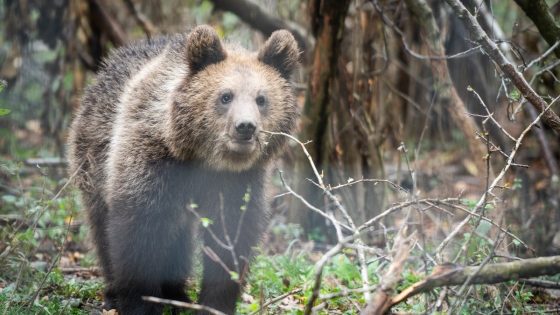At a bear sanctuary in the heart of Romania’s Carpathians, several cubs believed to have been orphaned have just arrived.
There are fears that more will need shelter now that the country has authorised the hunting of this protected species, effectively overturning a ban in place since 2016.
Florin Ticusan and his team care for 128 brown bears at the Libearty Bear Sanctuary, which says it is the biggest such refuge in the world. The facility is located in Zarnesti, 180km (111 miles) north of the capital, Bucharest.
Bears are officially protected in Romania. The government estimates there are 8,000 of them, the largest population in Europe outside Russia.
There was a hunting quota of 220 last year and 140 the year before, but in those instances, the permits came with tight restrictions.
The European Union country is allowing 481 of the animals to be killed this year. The government argues the bear population is too large and attacks have been increasing.
Animal welfare and environment activists say conflicts between people and bears are caused by human behaviour but there is a lack of political will to tackle the subject.
Bears are being pushed out of the forest, their natural habitat, because of deforestation and a shortage of food, said sanctuary founder Cristina Lapis.
Romania is a major exporter of the forest berries and mushrooms the animals would usually eat.
The refuge, which welcomes 30,000 visitors a year, also takes in bears rescued from zoos in neighbouring Ukraine, as well as from Albania, Armenia and even the United States.
The centre seeks to educate its visitors about bears’ needs and natural behaviour.
“Bears have fundamentally changed their behaviour over the last few years and begging on the road has become their main food source,” Environment Minister Mircea Fechet said recently.
Fechet argued the bears posed “an imminent danger to tourists” who approach them and suggested they should be transferred to places like Libearty.
The sanctuary believes there are other solutions to managing the bear population, such as putting rubbish bins out of their reach, installing electric fences where required and educating people about how to live together with the animals.
While it is too early to measure the impact the resumption of hunting will have, Lapis is worried it will lead to even more orphaned bears being brought to her centre, which is already struggling to find funds to feed all its residents.
She said the sanctuary won’t place rehabilitated bears back in the forest because the recent culling law meant they just risked becoming “cannon fodder”.
Ioan Banucu, the head of a company which organises “hunting and shooting holidays in the Romanian wilderness”, said he organised expeditions for foreign hunters.
Five bears had been shot dead since October, he said. “But some customers have reservations,” he acknowledged without elaborating, adding that interest in other species, like wild boars, was greater.
Bear hunting does not come cheap. It costs up to 8,000 euros ($8,500) per bear, depending on the size.





